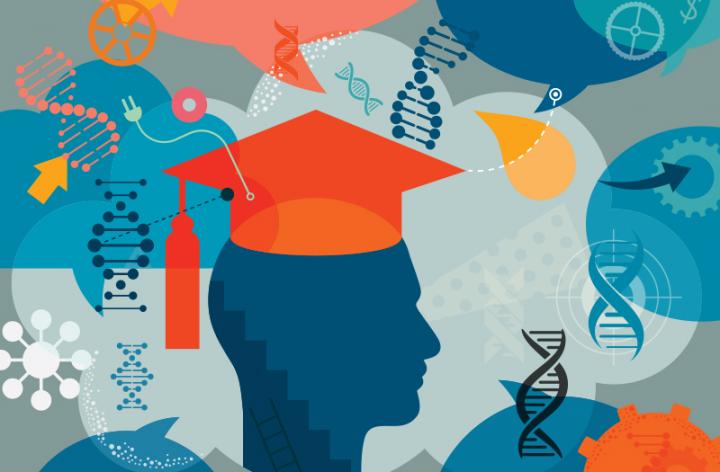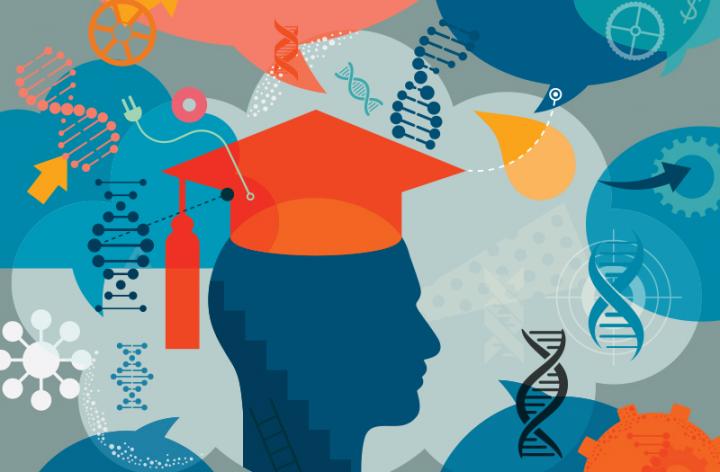
Credit: Letty Avila, USC Dornsife College
An international group of scientists has identified nearly 1,300 genetic variants associated with how much education someone may complete — far more than the 74 variants initially discovered in a smaller study two years ago.
This latest research, published on July 23 by the journal Nature Genetics, is one of the largest genetics studies to date. It is based on genetic information from over 1 million individuals with European ancestries — more than three times the size of the 2016 study.
The total influence of the genetic variants is small, explaining about 4 percent of the variation in educational attainment across individuals, the scientists said.
"Even variants with the largest effects predict, on average, only about three more weeks of schooling in those who have those variants compared to those who don't," said Daniel Benjamin, corresponding author and associate professor for the Center for Economic and Social Research at USC Dornsife.
"Yet, when we analyze the combined effects of many genetic variants, taken together they can predict the length of a person's formal education as well as demographic factors."
The data for this study were from the UK Biobank Resource, the personal genomics company 23andMe, and the combined results of 69 other, smaller genetic studies.
The predictive power of genes
Scientists have known for many years that demographic factors are associated with educational attainment, including household income and maternal education.
To assess the importance of the gene variants in educational attainment, the scientists established a 'polygenic score' that captures the predictive power of a combined 1 million genetic variants — including those specifically linked to educational attainment and the other remaining variants that the scientists had measured across the genome.
The scientists found that the predictive power of the score is as large as that of demographic factors.
"The very small effects of individual genetic variants confirms what we've seen in our earlier work, and it's an important finding in itself," Benjamin said. "It would be completely misleading to characterize our results as identifying 'genes for education.'
"Yet, the polygenic score is useful for research because it combines the effects of a very large number of genetic variants."
The authors have developed a set of Frequently Asked Questions about this study to help explain its implications.
Genetic impact on the brain
For the latest study, the scientists analyzed a combined 71 datasets comprising over 1.1 million participants with European ancestry from 15 different countries and who were least 30 years old.
Educational attainment is primarily influenced by environmental and social factors, but it is also influenced by genes associated with, for example, cognitive function such as memory and personality traits such as conscientiousness.
"We found that many of the genes associated with educational attainment are influential in virtually all stages of brain development and in neural communication within the brain," said Peter Visscher, another senior author of the study and a professor at the University of Queensland.
The scientists found that genetic variants on the X chromosome explain virtually identical amounts of variation in men and women. This finding lends support to the hypothesis that there are no genetically based sex differences in the amount of variation in educational attainment.
There are many other genetic variants associated with educational attainment that have not yet been identified. "We will need even larger sample sizes to identify them," Benjamin said.
###
About the study
The study was led by the Social Science Genetic Association Consortium. The consortium investigates the influence of genetics on human behavior, well-being and social science-related outcomes through large-scale studies of human genomes. Seventy-eight researchers helped conduct this study.
Funding for the study came from several sources: the Ragnar Soderberg Foundation (E9/11, E24/15), the Swedish Research Council (grant no. 2017-00641), the Jan Wallander and Tom Hedelius Foundation, an ERC Consolidator Grant (647648 EdGe), the Pershing Square Fund of the Foundations of Human Behavior, the Open Philanthropy Project, and National Institute on Aging/National Institutes of Health (grants P01-AG005842, P01-AG005842-20S2, P30-AG012810, and T32-AG000186-23 to NBER, and R01-AG042568 to USC).
Media Contact
Emily Gersema
[email protected]
213-361-6730
@USC
Original Source
https://pressroom.usc.edu/scientists-find-hundreds-of-genes-linked-to-educational-attainment/ http://dx.doi.org/10.1038/s41588-018-0147-3





